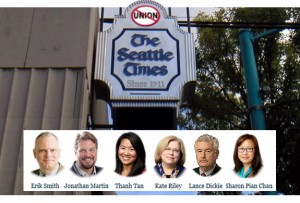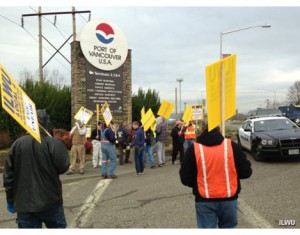OPINION
Sign of the Times: Holding greedy corporations harmless
By DAVID GROVES
(Aug. 15, 2014) — An employer lockout of union workers that has dragged on for nearly 18 months is headed toward resolution this week, and Washington Gov. Jay Inslee deserves some of the credit for refusing to continue facilitating the status quo.
The reaction of The Seattle Times editorial board? Don’t try that again, Governor.
The paper’s pundits are mad because last month the governor decided to stop providing Washington State Patrol escorts for state grain inspectors to cross a union picket line at the Mitsui-United Grain Corp. terminal in Vancouver. The governor’s move temporarily suspended inspections, which dramatically slowed the terminal’s operations, and with the harvest season upon us, created renewed urgency for ongoing contract negotiations to resolve the dispute.
On Wednesday, a tentative contract agreement was announced between the International Longshore and Warehouse Union and the Grain Handlers Association of companies operating Pacific Northwest grain terminals. If ratified by ILWU members, as recommended by their union, Mitsui-United Grain will call off its nearly 18-month lockout of its employees. The Federal Mediation and Conciliation Service, which had tried for months to broker a resolution, called the deal “an amazing achievement.”
On Thursday, rather than congratulating all parties involved — perhaps even the governor for his role in helping prompt the apparent resolution of a long, contentious dispute — The Seattle Times editorialized that it was a “close call” and chastised Inslee for the fourth time in the past few weeks for being “willing to imperil sales and world market share for an industry worth billions to this state and the inland West.”
 But what about Mitsui? This international corporation locked out its employees. These workers didn’t want to go on strike. They were willing to continue working amid negotiations for a new contract. Instead, Mitsui’s aggressive gambit to cut wages and benefits — and perhaps get rid of the union completely — created a volatile picket line of justifiably angry employees. Surely, the company’s lock-out-and-starve-out strategy also “imperiled” the region’s multibillion-dollar grain industry, no?
But what about Mitsui? This international corporation locked out its employees. These workers didn’t want to go on strike. They were willing to continue working amid negotiations for a new contract. Instead, Mitsui’s aggressive gambit to cut wages and benefits — and perhaps get rid of the union completely — created a volatile picket line of justifiably angry employees. Surely, the company’s lock-out-and-starve-out strategy also “imperiled” the region’s multibillion-dollar grain industry, no?
Mitsui is not even mentioned in the Times editorial. The role the company’s aggressive tactics played in jeopardizing grain shipments is ignored while editors accuse Inslee of — gasp! — taking sides in a labor dispute.
The reality is that allowing the status quo to continue indefinitely would have been taking sides. The state is under no obligation to assist Mitsui or any other private company to maintain its operations after it chooses to lock out its workers.
For nearly 18 months, 44 employees and their families in our community have suffered tremendously. Why?
Mitsui claimed its lockout was in response to an angry employee “sabotaging” company equipment, but county prosecutors never filed charges due to lack of evidence. Nonetheless, Mitsui said the incident merited locking out every member of ILWU Local 4 from their jobs — and, oh yeah, replacing them with cheaper nonunion workers — since Feb. 27, 2013.
 The ILWU immediately pointed out that the lockout was planned in advance, long before the alleged sabotage, because Mitsui had already solicited the services of replacement workers and tugboats. The union said the company had just been looking for an excuse to impose it. And naturally, this lockout created a volatile situation on the picket line set up in protest. Charges of illegal harassment have been made by both sides, including that a picketer was hit by a truck.
The ILWU immediately pointed out that the lockout was planned in advance, long before the alleged sabotage, because Mitsui had already solicited the services of replacement workers and tugboats. The union said the company had just been looking for an excuse to impose it. And naturally, this lockout created a volatile situation on the picket line set up in protest. Charges of illegal harassment have been made by both sides, including that a picketer was hit by a truck.
In August 2013, a state grain inspector filed a police report claiming to have been harassed while crossing the picket line. Initially, the Vancouver Police Department escorted state grain inspectors through the picket line, but soon stopped. In October, Gov. Inslee directed state troopers to escort the inspectors. But in early July, after 10 months of providing escorts and no resolution to the dispute in sight, the governor pulled them, saying that “keeping WSP escorts in place was not leading to productive negotiations, as intended.”
Mitsui then asked the Clark County Sheriff’s Office to provide escorts — proposing to reimburse them for the cost — but Sheriff Garry Lucas flatly rejected the request:
My position is that the law enforcement role is a neutral enforcement role that preserves the peace, protects life and property, and protects the rights of the parties as it relates both to the law and the Constitution of the United States. It becomes difficult to maintain neutrality when a police agency is a contractor/employee of one of the parties… We have never, and as long as I’m the sheriff never will, act as an escort to a private company involved in a labor dispute to transport or escort management staff, subcontractors, or third parties onto management’s property.
Clearly, The Seattle Times believes that the Northwest’s grain industry, everyone in its supply chain from farmers to elevator operators to overseas buyers, and Washington state’s reputation as a reliable trading partner were all at stake in this dispute.
 If that’s so, maybe the lesson learned for Governor Inslee should be that having the ability to imperil all of that for one month — let alone 18 — is too much power in the hands of one greedy international corporation.
If that’s so, maybe the lesson learned for Governor Inslee should be that having the ability to imperil all of that for one month — let alone 18 — is too much power in the hands of one greedy international corporation.
David Groves is Editor of The Stand.





